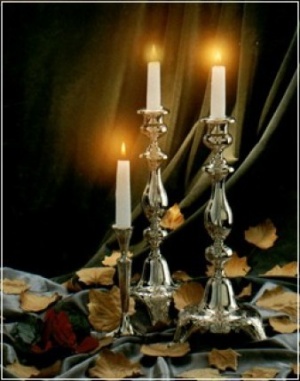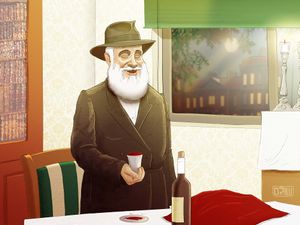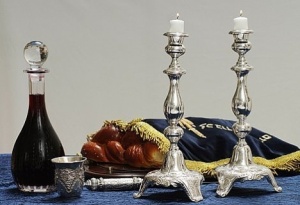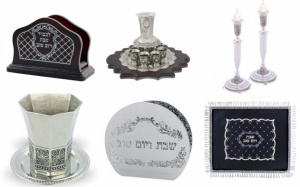Shabbos

Shabbos - The seventh day of the week contains both positive and negative mitzvos - the positive mitzvah to rest and the negative mitzvah not to do work.
The revealed reason for this mitzvah is because Hashem "rested on the seventh day from all His work which He had done" after the six days of Creation. Similarly, we are commanded in the Torah "and on the seventh day you shall rest" and "you shall not do any work."
In Kabbalah and Chassidus, it is explained that Shabbos contains the letters "tashev", meaning the return of the spiritual lights to their source.
It is explained that on Shabbos there is an elevation of the worlds. During the weekdays, there is the work of birurim (refinement) where malchus d'atzilus descends into the worlds of Briah, Yetzirah and Asiyah to refine the nitzotzos (sparks). On Shabbos, these refined sparks that were elevated during the week are included in Atzilus.

In Chassidic Teachings[edit | edit source]
The mitzvah of Shabbos is essentially resting from work, primarily the 39 melachos forbidden on Shabbos. Certain chassidim are mehader in many things like tasting the Shabbos foods on erev Shabbos and many other hiddurim that were mostly practiced by the Chabad Rebbeim. "It is the minhag Yisroel in many places to beautify the home with flowers in honor of Shabbos and Yom Tov."

The Nature of the 39 Melachos[edit | edit source]
The reason for this mitzvah is rooted in these melachos during the week, which are internally the work of birur in this world. For example: The melachos of plowing and planting etc. are aspects of tikkun and birur to elevate from the growing power in the earth, to grow foods that give strength and vitality for man to live. Their elevation and tikkun occurs when a person makes brachos before and after eating and draws down kedusha, and afterwards when receiving vitality from this food, the food's vitality is included in the person's vitality and strengthens their koach and sechel, and with this koach and sechel they daven and learn and fulfill mitzvos, thereby elevating the food's vitality with them and including it in their avodah.

Similarly, baking and cooking are actions done to rectify food to make it fit for human consumption, and weaving two threads is an action done to create human clothing. Building and similar melachos are tikkun to make a dwelling fit for human habitation. Generally all melachos involve food, clothing and dwellings. Through performing these melachos l'shem shamayim, one elevates the vitality within them.
This birur is the refinement of the 288 nitzotzin that fell in shevirat hakeilim in the worlds of Briah-Yetzirah-Asiyah, which need to be elevated from BYA to Atzilus. The world of Atzilus is the world of tikkun that was already rectified, not through human effort. Man's tikkun is in the worlds of BYA, where he was given the ability to rectify and refine.
The Prohibition Against Doing Them on Shabbos[edit | edit source]
For this reason, it is forbidden to do these 39 melachos on Shabbos, since all this work is for the weekdays but on Shabbos there is no birur and tikkun at all, only eating which is from above to below, "a tzaddik eats to satisfy his soul."
The weekday avodah is in the aspect of mayim nukvin and the aspect of rectifying and refining the name BaN, while the tikkun of Shabbos is the refinement of MaH which comes after the tikkun of BaN in the aspect of mayim duchrin.
Three Levels of Shabbos Observance[edit | edit source]
The mitzvah of keeping Shabbos encompasses the three garments of the nefesh:
- Action - Not performing weekday melachos
- Speech - Not speaking about weekday melachos, "one should not say 'I will do such and such tomorrow'"
- Thought - Not thinking about weekday melachos, "it is commanded not to think about one's business matters at all, rather it should be in one's eyes as if all work is already completed"
A chossid who goes beyond the letter of the law is also careful about thinking about melacha on Shabbos - since in actuality Hashem rested even from thought, and due to cleaving to the ways and middos of Hashem, he also rests from his thoughts.
See Also[edit | edit source]
External Links[edit | edit source]
- Shabbat - An Inner Perspective, from the book 'People of the Word' (English)
- On Shabbat, do we study only Chassidut or also 'Nigleh'? • An interesting topic, on the website 'Moisture of Redemption'
- Moshe Shilat, Learning unit on the topic of Shabbat, published by Mayanotecha Institute in partnership with the Ministry of Education
- Is it permissible to play tennis on Shabbat? This is how the Rebbe responded, on the website 'Moisture of Redemption'
- Dov Menachem Debroskin, It is a mitzvah to sing on Shabbat, Migdal David Volume 17, 3 Tammuz 5784 / 2024, page 371
